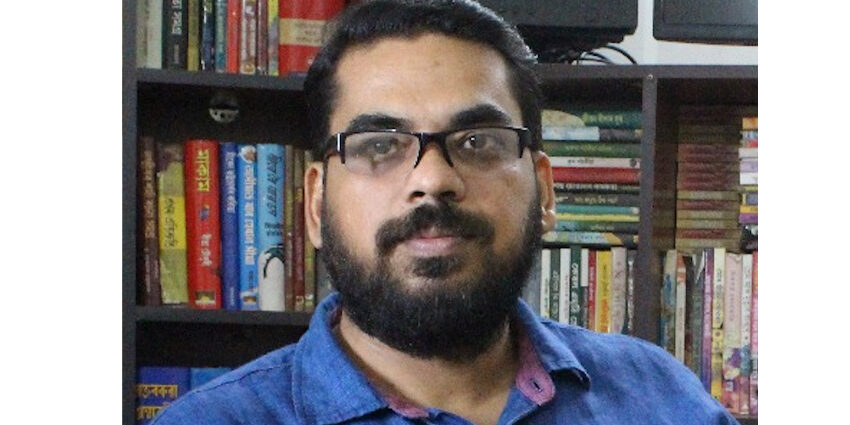Dr Ankuran Dutta is an Associate Professor and the Head of the Department of Communication and Journalism at Gauhati University in Guwahati. Dr Dutta is a media educator by profession with an experience of about 15 years and he is currently involved in different academic activities in India, Bangladesh, Canada, Maldives, Sri Lanka, Pakistan and Malaysia.
He was awarded the prestigious ‘National Award for Outstanding Efforts in Science and Technology Communication in the Electronic Medium, 2018’ by the Ministry of Science and Technology under the Government of India in 2019. He was also awarded as the Best Media Educator (Associate Professor) at Media and Media Education Summit in 2018 in New Delhi.
Dr Dutta was nominated from India to participate in SUSI in Journalism and Media at E. W. Scripps School of Journalism at the University of Ohio in the USA from June to August in 2018. He also pursued short-term research at York University in Canada in 2011 as a Shastri Indo-Canadian Institute Fellow.
Communication is very diligently used by Dr Dutta to inculcate scientific temperament among the marginalized communities in South Asia. He has empowered communities through the technical hands-on intervention of community radio among information-poor communities. Veering into domains of science, risk and health communication through innumerable programmes using models like CLP and SBCC, Dr Dutta continues to work in the development sector. He has authored, edited and translated books, research papers and articles on the domain and organised local, national and international events to make science easy to decipher for all and dispel miscommunication.
Dr Ankuran Dutta started by candidly admitting that he is not a fact-checker himself. However, Dr Dutta has been playing an instrumental role in creating awareness on false information for a while now. Concerning the origin of the word Fake News, Dr Dutta said, “The US President Donald Trump used it for the first time and made it a household word.”
He added that the term infodemic is a new term that owes its origin to the twin words information and pandemic. In very simple words, infodemic is the pandemic of false information.
Dr Dutta said, “Fake news is deliberately fabricated and published with the intention to deceive.” While deliberating on the topic, he differentiated among the words misinformation, disinformation and mal-information. He interestingly remarked that infodemic spreads faster than pandemic and went on to add that false news circulates six times faster than true news.
As of January 2020, the total number of active internet users in India stood at 69 crores, which makes the country the second-largest in terms of the sheer number of internet users. To top it, the total number of people who use social media is 40 crores. According to Dr Dutta, this has ushered in a digital revolution in the country, which has further complicated the scenario.
Dr Dutta then spoke about misbeliefs and superstitions, which are as dangerous as fake news. He took the example of state-sponsored superstitions and mentioned the preeminence of the number nine in Indian Prime Minister Narendra Modi’s actions. He also spoke about clapping and the banging of dishes on the day of the Janata Curfew. According to Dr Dutta, these actions are counterproductive and could spark off unnecessary superstitions. The next example that Dr Dutta took was the unsubstantiated claims that cow dung, cow urine and the water from the River Ganges could cure Coronavirus.
Dr Dutta quipped that not only political parties but also religious institutions play a central role in spreading superstitions. Therefore, he vouched for sanitizing people’s minds in addition to sanitizing their hands. Dr Dutta said, “Digital literacy is very important.” He emphasized that fact-checking is not spell checking and hence requires more dedication.
According to Dr Dutta, “Conspiracy theories, misinformation and speculation about Coronavirus have flooded social media and misinformation doesn’t just come from dark corners of the internet. Many known people are associated.”
He added, “It has become as impo犀利士 rtant to flatten the curve of the Infodemic as to flatten the curve of Covid-19.”
According to him, there are 5D’s to sanitize the mind. These are 1. Discard unquoted stories, 2. Disbelief non-official stories, 3. Discourage fake news forwards, 4. Dismiss photos without verifying, and 5. Develop critical thinking.
In addition, he suggested the 5C’s to sanitize the mind. These are 1. Curtail excessive news content, 2. Contact near and dear ones, 3. Contain fear and anxiety as nothing is permanent, 4. Create new projects and new hobbies, and 5. Curb fake news.
The author, Rasaonara Ali is associated with Adamas University Media School.







